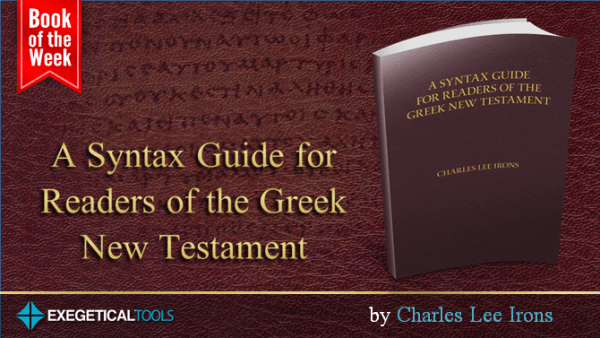 This week we featured Charles Lee Irons’ work, A Syntax Guide for Readers of the Greek New Testament, as our Book of the Week. And it is truly a resource to keep right next to your Greek New Testament. It could shave many precious minutes off your sermon preparation and keep you from flipping through your intermediate syntax categories every few minutes.
This week we featured Charles Lee Irons’ work, A Syntax Guide for Readers of the Greek New Testament, as our Book of the Week. And it is truly a resource to keep right next to your Greek New Testament. It could shave many precious minutes off your sermon preparation and keep you from flipping through your intermediate syntax categories every few minutes.
We asked Lee a few questions and he blessed us with very substantive and helpful comments on syntax, exegesis, and his forthcoming works.
Exegetical Tools
One of the first things I noticed about your guide was that it does not treat every phrase in the NT (and of course it couldn’t without thousands of pages). So what was your process for selecting syntax and grammar worthy of comment?
Lee Irons
Yes, I had to be selective. I chose to comment on features of the text that I suspected would not be immediately obvious to the beginner, which I defined as anyone who had taken a minimum of one year of beginning Greek or the equivalent. One of my main goals was to give brief explanations of syntax features that might cause the reader to get stuck, but I did not limit myself to that, since I also provide comments of more ordinary things, e.g., noting the presence of a genitive absolute. Of course, I had to make judgment calls about what to include and what not to include, but my overriding goal was to facilitate reading the text. Continuous reading of large portions of text is essential for growth in one’s ability to read Greek. My goal was to facilitate that by providing brief notes to get the reader over the speed bumps that frequently arise so that they can get their question resolved and get right back to reading the text with minimal interruption.
ET
How long did this project take you to complete, and what were the main resources you used for your own study?
Irons
It took about 10 years, from 2003 to around 2013. I began by taking notes for my own personal study as I was reading the entire Greek New Testament every year. I gradually added to my notes each time I read through it. By 2008, I had separate documents for each book of the New Testament which I made available on my www.upper-register.com website. Users began to tell me how helpful the notes were in their own reading of the Greek New Testament, so I decided to see if I could find a publisher. Before submitting them for publication, I did one final pass-through in which I increased the number of comments by about 50%. After receiving numerous rejections, I was so thankful when Kregel agreed to publish the project.
As for the main resources that I used, I found the following works to be the most helpful by far: A Greek Grammar of the New Testament and Other Early Christian Literature by Blass, Debrunner, and Funk (BDF), and A Greek-English Lexicon of the New Testament and Other Early Christian Literature by Bauer, Danker, Arndt, and Gingrich (BDAG). They actually go together quite nicely, since BDAG often quotes BDF. Although it is a lexicon, BDAG contains a wealth of grammatical information, especially in its entries on the utility words like καί and the numerous usages of the prepositions. For example, BDAG lists 18 main usages for ἐπί with subdivisions within those.
In addition to those two tools, I also relied on Greek Grammar Beyond the Basics by Daniel Wallace, An Idiom Book of New Testament Greek by C. F. D. Moule, and to a lesser extent Biblical Greek by Max Zerwick, and the companion volume, A Grammatical Analysis of the Greek New Testament by Zerwick and Mary Grosvenor. Wallace has been criticized for multiplying categories unnecessarily, but for the exegete his grammar is very useful, as long as one recognizes that some of his categories arise more from the usage in context and do not necessarily represent analytically distinct semantic meanings of the genitive, the aorist, etc.
I also relied heavily on Metzger’s Textual Commentary on the Greek New Testament (2nd ed.), which was very helpful in relation to syntax, because many of the scribal changes were attempts to smooth out the Greek where the scribes perceived a difficulty. By studying the secondary readings, one can get an idea of how the scribes understood the syntax in such difficult spots. Such readings are clearly secondary, that is, scribal attempts to correct the syntax, but they are not irrelevant to the exegete. Secondary readings often provide the earliest commentary on the Greek text by providing alternative ways of trying to make sense of the text.
ET
Did you learn anything significant about Greek through the process of writing this book that has stuck with you?
Irons
I discovered that there are many interesting things that they don’t teach in first-year, or even second-year, Greek! Greek, like any language, is a living tool of communication. It is not a mechanical algorithm that follows all the rules perfectly. And so there are all sorts of constructions and usages in the actual Greek New Testament that don’t fit our tidy expectations.
I was also impressed with the extent to which the vocabulary, syntax and style of portions of the Greek New Testament have been influenced by the translation Greek of the Septuagint (or Old Greek). I attempted to note as many instances of this as I could in my Syntax Guide. See also the index under “Septuagintisms.” I am not suggesting that Deissmann was wrong when he critiqued the notion that New Testament Greek is somehow a specialized or sanctified dialect of Greek. I agree with Deissmann that it is ordinary Koine Greek through and through. Nevertheless, I sense that Deissmann’s emphasis, carried on by Moulton and Milligan, has made it harder for scholars to appreciate the tremendous impact of the Septuagint on the Greek of the New Testament.
Another thing that stood out was just how varied the Greek of the New Testament is. You have the style of Luke the historian, the harrowingly difficult Greek of 2 Peter and Jude, the lovely Greek style of Hebrews and James, the very rough Greek of Revelation with its many solecisms, and the simple but majestic style of Matthew.
ET
Can you give us any examples of passages you studied that profoundly impacted you in one way or another once you understood its syntax better?
Irons
It is rather unusual for the study of syntax, in and of itself, to profoundly impact the way one interprets a passage. That isn’t to say it’s unimportant, but syntax is a subordinate tool for communicating meaning. The meaning is usually clear from the context—both the broad context of the entire book and the narrow context of the immediate paragraph and sentence. In cases where the meaning is unclear or ambiguous, the syntax is usually ambiguous and could be taken in two or three different ways. In my Syntax Guide, whenever this was the case, I listed the options in order from least likely to what I thought was the most likely. As in textual criticism, there are some cases where there are two equally valid options, making it very hard to choose between them.
That may be a little demoralizing to the beginning Greek student. The beginning Greek student wants to believe that learning Greek will give him or her the magic keys to unlock the meaning of the text. But it doesn’t work that way. What knowledge of Greek does is give you the tools to be able to better understand why there is more than one way of interpreting or translating a verse, and to be in a position to weigh the options.
Having said that, however, I do think there is an incremental advantage to being deeply conversant with the Greek text of the New Testament. Being deeply immersed in the Greek text allows one to see things that others aren’t able to see as well. One begins to notice certain things about the Greek style of a particular author and is therefore in a better position to weigh interpretive options.
For example, Paul is fond of using comparisons involving the adverbial use of καί (“also”). There are a number of places in Paul’s letters where scholars have proposed interpretations that require one to essentially ignore the adverbial καί. I would regard such interpretations as suspect. A good example would be Phil 2:5: τοῦτο φρονεῖτε ἐν ὑμῖν ὃ καὶ ἐν Χριστῷ Ἰησοῦ. The traditional interpretation is, “Let this mind be in you, which was also [adverbial καί] in Christ Jesus” (KJV). But an alternative interpretation has been suggested: “Have this mind among yourselves, which is yours in Christ Jesus” (ESV). The problem with the alternative interpretation is that it requires us to ignore, or at least substantially downplay, the adverbial καί as introducing the second half of a comparison.

ET
You’ve written some other excellent works, including the already-influential WUNT II study “The Righteousness of God: A Lexical Examination of the Covenant-Faithfulness Interpretation.” What writing projects do you have in the works that we can look forward to?
Irons
Thanks for mentioning my book, The Righteousness of God, published by Mohr Siebeck in 2015. It is the published form of my doctoral dissertation written under the supervision of Donald A. Hagner at Fuller Theological Seminary. It is basically a word study of “righteousness” terms in the Hebrew and Greek Old Testament and in Jewish literature. I argue against the New Perspective interpretation that δικαιοσύνη θεοῦ in Paul should be rendered “God’s covenant faithfulness.” Instead I argue that in seven of its Pauline occurrences (Rom 1:17; 3:21-22; 10:3 [2x]; 2 Cor 5:21; Phil 3:9), the phrase refers to the gift of (imputed) righteousness that comes from God, taking the genitive θεοῦ as a genitive of author or source. Those who are interested in learning more about the book are invited to read the 3-part interview conducted by Matthew Montonini earlier this year on his blog.
I am currently working on another word study, this time of an important theological word in the Johannine literature. Traditionally, the word μονογενής in John’s Gospel (John 1:14, 18; 3:16, 18) and Letters (1 John 4:9) was understood as “only begotten.” However, since the time of Westcott, the term has been interpreted by modern scholars as having nothing to do with “only begotten” and as merely meaning “only” or “unique.” I have conducted a nearly exhaustive study of the word μονογενής, as well as other words formed with the -γενής stem, in biblical and extra-biblical Greek, and I am convinced that the traditional interpretation is closer to the truth. I would not argue that the term never means “only” or “unique,” but that the meaning “only offspring,” with the implication of having no siblings, is the most basic meaning. One of the things I am excited about is using the tools of cognitive semantics to aid in this particular project. Using the latest tools of modern linguistics, I hope to rehabilitate an important set of proof texts for the much misunderstood and sadly neglected but crucially important doctrine of the eternal generation of the Son.
Thanks to Lee for answering our questions! He has done very fine work so far in his career and we very much look forward to his new work on μονογενής and his other future projects.
Read our Book of the Week post, featuring his Syntax guide.
Preview or buy it on Amazon.

